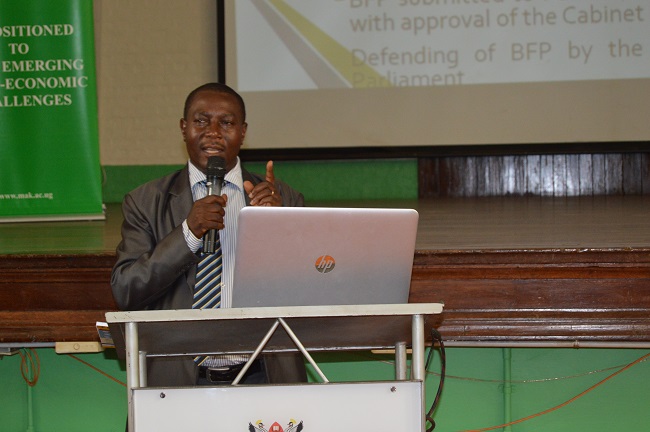Makerere University Chairperson of Council Mrs Lorna Magara has applauded Makerere University Management for taking active steps towards a participatory budgeting process. This was during the Second Budget Management Workshop held on 15th October 2019, to review the implementation procedures and execution processes of the Makerere University Budget for the Financial Year 2020/2021.
The workshop brought on board university stakeholders to discuss budget appropriations with an insight of the university and national development objectives. According to the Acting University Secretary, Mr. Yusuf Kiranda, government entities in Uganda are required by law to involve stakeholders in the financial planning activities for probity and inclusive resource allocation.

“The University has several competing priorities and the University Secretary/ Accounting Officer has a major task of distributing the limited resources among the competing priorities. This budget workshop was therefore scheduled to share with you the tasks of setting priorities for the University,” he said.
He called upon stakeholders to align the budgets to the Makerere University Strategic Plan objectives. Mr, Kiranda also emphasized the need to prioritize research if the university is to attain its goal of becoming a research led university.
Represented by Mr. Bruce Kabaasa, the Chairperson of the Finance, Planning, Administration and Investment Committee (FPAIC), Mrs. Lorna Magara said that a participatory budgeting process is a requirement of both the law and the principles of good governance. “The Finance Management Act of 2015 (as amended) clearly defines this obligation. Section 9(1) of the said law requires every Accounting Officer to prepare a budget framework paper in consultation with the relevant stakeholders,” she said.
She requested every stakeholder in the budget process to provide input on time as per the requirement in the Public Management Act. She urged the University Management Budget Committee to take a keen note of the following while drafting the budget:
- How the University is to operationalize the new strategic plan
- How previous policies of the University Council have been complied with; especially the distribution of the percentage of the AIA (Internally Generated Funds) between the colleges and Central Administration.
- Ensuring that funds collected for a given purpose are effectively utilized. Special attention will be accorded to the utilization of functional fees.
- Ensuring that the core activities of the University such as teaching materials, internship, recess term, examinations and external examiners are prioritized over and above allowances, travel, workshops.
- Ensuring that the allocations are transparent and the budget formulation process is inclusive.
The Vice Chancellor of Makerere University Prof. Barnabas Nawangwe, applauded the Department of Finance and the Office of the University Secretary for organizing the participatory Budget Management Workshops. He encouraged stakeholders to prioritize research, teaching and learning while drafting unit based budgets.

Prof. Nawangwe urged the Unit Accounting Officers to prepare budget frameworks in consultation with relevant stakeholders. He also advised them to observe the timelines for budget submission.
“The budget must include the component of supporting diversification of revenue and we must establish and fund Research Grant Office at college levels,” he said.
Representing the Acting Deputy Vice Chancellor for Finance and Administration, Prof. William Bazeyo, the Principal of College of Business and Management Sciences who also doubles as the Chairperson of the Management Budget Committee, Dr. Eria Hisali highlighted the importance of a consultative and participatory budget process.
“Through the budget workshops, we can restructure our University by planning within the available resources to impact development and sustain university activities. We also need to focus on how we can effectively utilize the available resources and put in place measures to ensure financial sustainability,” Dr. Hisali stated.

During the workshop, participants listened to two presentations; the Overview of the Budget Performance and Outlook for Financial Year 2020/2021 and MTEF Figures, Revenue and Expenditure Projects (including indicative planning figures for per cost centres) from the Acting Director of Planning and Development Department Mr. Matia Kabuye and University Bursar, Mr. Evarist Bainomugisha respectively.
The informative presentations were further enriched by an interactive discussion chaired by the Manager of Accounting and Reporting, CPA Lubowa Ssebina Gyaviira.
Article by Mak Public Relations Office


 General16 hours ago
General16 hours ago
 General16 hours ago
General16 hours ago
 Humanities & Social Sciences2 weeks ago
Humanities & Social Sciences2 weeks ago
 General1 week ago
General1 week ago
 Agriculture & Environment2 weeks ago
Agriculture & Environment2 weeks ago





